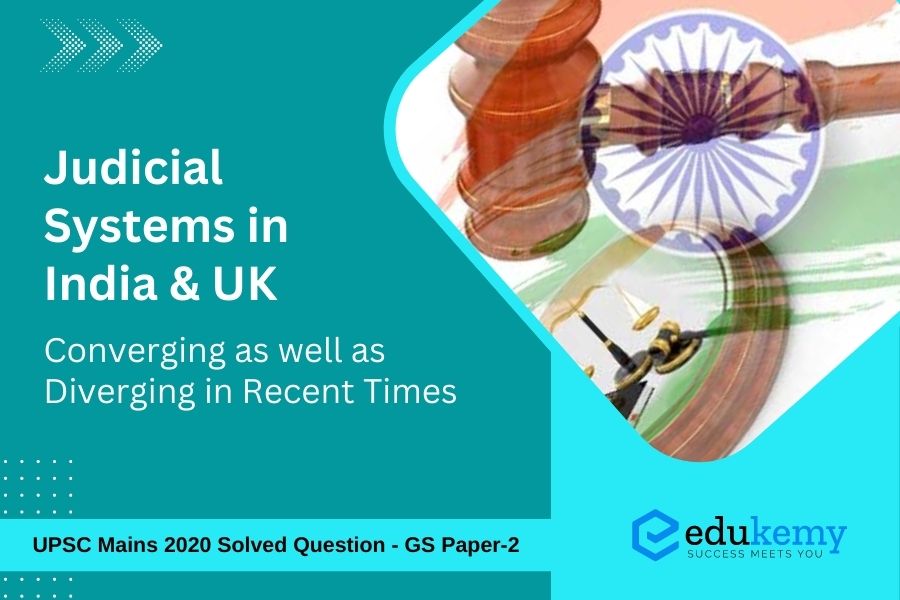In recent times, the judicial systems in India and the United Kingdom exhibit a complex interplay of convergence and divergence. Both systems share a historical legacy rooted in the common law tradition, a legacy inherited during the colonial era when British legal principles heavily influenced the Indian legal framework. This common foundation has led to a convergence in terms of certain legal principles, procedural norms, and the overarching commitment to the rule of law. However, divergences have also emerged, driven by distinct socio-cultural contexts, constitutional frameworks, and evolving legal interpretations. India’s judiciary, for instance, has increasingly asserted its independence, engaging in judicial activism to protect fundamental rights and promote social justice. Meanwhile, the UK has witnessed legal developments influenced by its evolving relationship with the European Union, highlighting differences in their legal trajectories. Despite these nuances, both systems continue to engage in a dynamic exchange of legal ideas, contributing to a global legal discourse that reflects the complexities of modern legal practice.
UPSC Mains General Studies Paper – 2 Mains 2020
Comparison of the Indian Constitutional Scheme with that of Other Countries.
Structure, Organization and Functioning of the Executive and the Judiciary.
UPSC Mains Civil Services IAS Exam Question Paper – 2020
Contents
- 1 Structure of the Question
- 2 Answer
- 3 Conclusion
- 4 Frequently Asked Questions (FAQs)
- 4.1 1. How are the judicial systems in India and the UK converging in recent times?
- 4.2 2. In what ways do the judicial systems in India and the UK diverge despite recent convergences?
- 4.3 3. How has the adoption of technology influenced the convergence of judicial systems in India and the UK?
- 4.4 4. What role do international legal norms play in shaping the convergence of the judicial systems in India and the UK?
- 4.5 5. How do cultural and societal factors impact the convergence and divergence of the judicial systems in India and the UK?
Structure of the Question
- In Introduction,
- Bring about the general cause of comparable judicial systems.
- In Body,
- The points of convergence in the judicial systems.
- The points of divergence in the judicial systems.
- In Conclusion, write about the significance of such judicial systems.
Answer
Introduction
The idea of convergence is the method of getting together from different directions so as to ultimately produce a common conclusion. Both India and the United Kingdom are democratic countries with parliamentary form of government. Besides, there are differences as well as similarities on how the Executive, Legislature and Judiciary of these countries function. The Indian Judicial System has its origin in the ‘Mayors Courts’ established by the East India Company in 1726. The judicial systems developed imbibing the features like rule of law, and recording judicial precedents.
Convergence in Judicial Practices
Independence of Judiciary
In Britain as well as in India the judges can only be removed from the office for serious misbehavior and with the consent of both the Houses of Parliament.
Ultra-vires
Courts in both the UK and in India can declare the action of an executive as ultra-vires i.e. acting or done beyond one’s legal power or authority.
Interpretation of Constitution
The courts in both India as well as in the UK act as the highest interpreter of the constitution.
Rule of Law
Both countries follow the principle of Rule of Law, where no individual is granted any special privilege before the court of law and the laws apply equally to all citizens irrespective of their social-economic or other difference i.e., equality before law.
Writ Petition
Instrument of writ petitions to uphold Rule of Law and that the judiciary of both nations can review the acts of the executives.
Divergence in Judicial Practices
Sovereignty of Parliament
Under the doctrine of Parliamentary sovereignty, the judiciary in the UK lacks the power to strike down an Act of Parliament. However, in India, the courts have been given this power.
Basic Structure Doctrine
The courts in India have come up with the Doctrine of Basic Structure, which prevents the executive from making laws or amendments that alter or deviate from the basic values enshrined in the Constitution. The British system lacks the concept of ‘Basic Structure’.
Unified Three-Tier System
The United Kingdom does not have a single unified legal system, England and Wales have one system, Scotland another, and Northern Ireland a third. The Constitution of India has established a unified three-tier system of judiciary, with the Supreme Court at the top.
Appointment of Judges
In the UK, the Constitutional Reform Act, of 2005 has created the Judicial Appointments Commission for the appointment of judges. However, in India, the Judges of the Supreme Court, as well as the High Courts, are appointed by the President under the collegium system.
Conclusion
The convergence of laws, legal processes, and systems is of crucial importance since disorganized fragments of laws and procedures augment uncertainty, interruption, delay, and transaction costs which instill divergence into the judicial system. The British judicial system provided the foundation on which the Indian counterpart was built. However, the Indian judiciary has evolved and learned from the best practices from around the world to safeguard Democracy and Rule of Law.
Frequently Asked Questions (FAQs)
1. How are the judicial systems in India and the UK converging in recent times?
Over the years, both India and the UK have shown a trend towards adopting and adapting certain legal principles and practices from each other. This convergence is particularly evident in the incorporation of international legal norms, mutual influence in interpreting human rights laws, and the adoption of modern technology for judicial processes. Understanding the factors driving this convergence can provide insights into the evolving nature of the legal systems in both countries.
2. In what ways do the judicial systems in India and the UK diverge despite recent convergences?
While there are instances of convergence, there are also notable divergences between the judicial systems of India and the UK. Differences in legal traditions, historical backgrounds, and constitutional frameworks contribute to distinct approaches in areas such as legal reasoning, the structure of the judiciary, and the role of precedent. Exploring these divergent aspects helps in comprehending the unique challenges and priorities shaping the legal landscape in each country.
3. How has the adoption of technology influenced the convergence of judicial systems in India and the UK?
In recent times, both India and the UK have been embracing technological advancements to streamline legal processes, enhance accessibility, and ensure efficiency in the delivery of justice. Understanding the impact of technology on the convergence of judicial systems involves exploring the similarities and differences in the adoption of digital platforms, e-filing systems, and virtual court proceedings in these two jurisdictions.
4. What role do international legal norms play in shaping the convergence of the judicial systems in India and the UK?
The influence of international legal norms and treaties on the legal systems of India and the UK is a noteworthy aspect of their convergence. Examining the extent to which both countries align with global standards, participate in international legal forums, and incorporate international jurisprudence into domestic judgments provides insights into the shared commitment to upholding universal principles of justice.
5. How do cultural and societal factors impact the convergence and divergence of the judicial systems in India and the UK?
Beyond legal frameworks, cultural and societal factors contribute significantly to the convergence and divergence of judicial systems. Exploring how cultural values, social dynamics, and public expectations shape legal interpretations, judicial decisions, and the overall administration of justice can provide a holistic understanding of the complex interplay between law and society in both India and the UK.

For UPSC Prelims Resources, Click here
For Daily Updates and Study Material:
Join our Telegram Channel – Edukemy for IAS
- 1. Learn through Videos – here
- 2. Be Exam Ready by Practicing Daily MCQs – here
- 3. Daily Newsletter – Get all your Current Affairs Covered – here
- 4. Mains Answer Writing Practice – here
Visit our YouTube Channel – here


